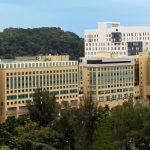Scholarship: Fully funded
Degree: B.S./M.S./Ph.D
Nationality: International Students
Location: USA
Application deadlines: Open
Scholarship Description:
The Buck Institute for Aging Research is located in the charming town of Novato, 30 minutes north of San Francisco, in the same Bay Area as UCSF, UC Berkeley and Stanford. Built in 1999, the Buck Institute was the first research institute in the world to focus on aging research and has partnerships with several Bay Area universities and companies (Calico, Unity Biotech, etc.) and is the centre of aging research in the West. The Institute has state-of-the-art facilities including a proteomics core, an imaging core and a bioinformatics core to support the research projects of each laboratory. The Institute currently covers almost all areas of ageing research and model organisms through extensive bench-to-bed collaborations. We are particularly interested in the structural and cell biological relevance of lysosomes, mitochondria and lysosomal function. Our ultimate goal is to map the mechanisms by which ageing occurs and apply them to age-related diseases.
The Zhou lab uses replicative ageing in budding yeast and human cellular senescence as primary models to study the onset and progression of senescence in conjunction with Drosophila, focusing on the link between proteostasis and hallmarks such as mitochondria. Defective proteostasis and mitochondrial dysfunction are two conserved hallmarks of ageing and many neurodegenerative diseases, including Alzheimer’s disease. We use a variety of state-of-the-art imaging methods, high-throughput screening, biochemistry, cryoEM, bioinformatics and machine learning to systematically study the cellular proteome response to stress, ageing and AD-related proteins. Our lab has a Zeiss laser scanning confocal with single photon sensitivity, a high throughput liquid handling robot and an automated super resolution spinning disc confocal, and has developed machine learning to analyse large volumes of imaging data to enable high throughput imaging, data acquisition and machine learning based data analysis. We believe that machines should do the repetitive work and researchers should focus on the creative work. The platform is a reliable technician that serves everyone and ensures high productivity for every researcher in the lab, the platform can be used for different model organisms and different projects, and most importantly we have to be imaginative.
If you are also interested in protein folding, protein misfolding/aggregation, phase separation, mitochondrial biogenesis and dysfunction in ageing and disease, and other cell biology topics, we hope you will join our family. We are a group of research enthusiasts with an ambitious goal. Our aim is to get postdoctoral fellows to publish a few high quality papers and to prepare projects that they can take into their own labs in the future. Their success is our common goal!
Available Subjects:
- Approaches and model organisms used in ageing research
Eligibility criteria:
- PhD or MD in biology or related field
- Research published in peer-reviewed journals
- Strong interest in protein homeostasis, cell biology and ageing
Application Procedure:
- Please submit a cover letter describing your previous research experience, plans and expectations for working in the lab. In addition, please include 1-2 paragraphs on specific questions related to our lab topics that you would like to research in our lab. This short research proposal will help us to focus our time on the candidate who best matches the interests of our lab. Please also include a current CV and details of three referees. Please do not hesitate to contact me by email ([email protected]).


